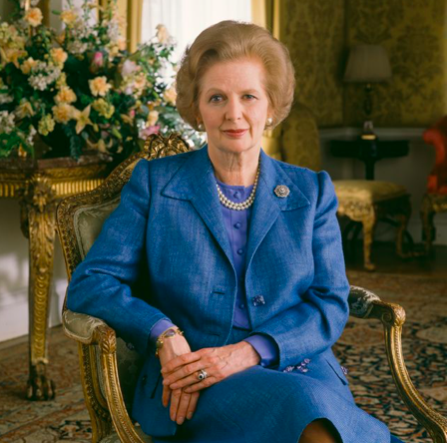
The Iron Lady
Margaret Thatcher polarised opinion, policy and people more than any other figure in modern political history. Contributor MATTHEW FLACKS remembers the United Kingdom's Prime Minister and calulates her legacy to Britain and the world

Margaret Thatcher
Rarely in the modern political history has a figure polarised opinion so much as Margaret Thatcher. Revered and resented in equal measure, her death in April provided the UK establishment with the opportunity to undertake some serious naval-gazing. Despite winning three consecutive general elections, and being the dominant public figure of a generation, the country was plunged into a divisive argument over the legacy of its first female Prime Minister. And it was as passionate as it was bitter. On both sides. She broached the facts and wielded the sword with brutal efficacy. Was it revenge against these all-powerful trade unions that she loathed so distinctly? Not quite. She wouldn’t have been so flippant with major policy. How about her green credentials? During her twilight years as prime minister, she made some very important environmental speeches highlighting issues such as the ozone layer, acid rain, and even called on international action—the first leader to do so. Was she recognising climate change? Was her policy to close the mines a call to a higher moral cause? Was she connecting coal use and man’s actions directly to environmental change? Her privatisation policies of waste, water, gas and electricity and the fact that she was a huge proponent of building nuclear power stations suggested not.
Sections of the population mourned for someone they saw as one of the great leaders. Others, metaphorically and joyously jumped on her grave. Some had rejoiced in her individualistic, free-market policies of providing swathes of the population with untold and unrelenting riches by deregulating and privatising society At Will so that people could make serious cash. Indeed, some did amass their fortunes, played the system and thrived in a culture of hungry business-minded mavericks. But others lost their livelihoods, communities and independence, and were left to fend for themselves in the resulting shark-infested waters. Mrs “T” left a country still very much defined by class and divided by wealth. Rather than redress the balance, she managed to reinforce it and set the precedent for her successors.
Everyone and anyone had an opinion and were more than happy to share it. Apparently, Thatcher was too. So now she’s gone, I may as well get in on the act. My major beef was the distinct lack of compassion she showed for the Arts, sending culture to the fringes of society for over a decade as an unnecessary luxury with no place in the state fabric or in the money-making world of capitalism. Ah, there it is: capitalism. The word that provokes such intense debate on both sides of the left-right divide. The prevalence of theatre, art and film was, like everything else, to be seen as a commodity to be traded, laundered and plundered. Extensive state funding on what was seen as liberal luxuries should not be encouraged, apparently. Worryingly, similar shifts are occurring today within the arts, as the government imposes its rigorous spending cuts to ‘encourage’ the brittle economic recovery. (It should note that arts in the UK contribute £7 to the GDP for every £1 subsidized.) Liberal tendencies were lazily clumped together as socialist ideals, and the very words socialism and society had become dirty during the 1980s as conservatism and capitalism firmed their grip. Hence we had a capitalist versus socialist struggle, in the archaic understanding of such ideologies. And we all know that one transpired.
This was no more keenly felt than in the coal-mining towns and villages that were brought to their knees, decimated, never to return, leaving lost generations to squander in unemployment and dissolution. That is not to say that Thatcher was the first to close a colliery. Far from it. But she did it with such abrupt speed and hardened attitude (she was hardly famous for her sympathetic manner) that it caused huge rancor within these communities who felt they’d been sacrificed as political pawns. What was her ‘beef’? Her disdain for the unions was widely acknowledged and her dismissive treatment of dissenters legendary. Indeed, before she came to power the unions had an iron-like grip on a country that had been crippled by strike after strike by workers of varied professions and industries. This left a deep imprint on her political compass.
In truth, Mrs Thatcher was never particularly interested in climate change and energy policy. She joined the conversation late in her tenure, making noises about ozone layers and the like. However, she doubted man’s impact on climate change in her autobiography in 2002, criticizing Al Gore’s renowned crusade as inciting panic and angst amongst the public. The stark fact was this: coal mines were not making money, and in Thatcher’s mind a non-profiteering company was a fail. Why on earth should the state continue to subsidise a failing industry? It made no economic sense for her.
The prime minister of the day looked at the facts and wielded the sword with brutal efficacy. They had to go. And they did. There were 186 coal mines in 1984—the year the miners took to the streets and picket lines—and this year, 2013, there are four. Startling indeed. She was never forgiven, mainly because nothing filled the vacuum. The rebuilding of areas so dependent on the local economy of coal mines simply did not materialize. Communities had no focus. Workers young and old had no income, no colleagues, and no hope. The irony was that as she attempted to shrink the state as much as she could, she was creating a whole new section of society suddenly heavily reliant on it. So the politic was clear. This had nothing to do with carbon emissions, with trying to bring an end to a toxic pollutant form of energy creation, or to get one over on the unions (that, for her, was a happy side-effect). It was a power of a different sort—financial. So the inevitable domino effect occurred with the radical demise of manufacturing and the extraordinary rise in the pinstriped hegemony of the city. The pound was king. Let’s make some money. And another bitter irony? The first female prime minister had managed to reinvigorate the ‘old boy’ network.
What is clear is that no leader has since managed a coherent energy policy with which to hang their green credentials. Indeed, no prime minister has redressed the balance of investment in the old coal mining areas, from either side of the political spectrum, but has merely hidden the problem under the veil of a more expensive cloth. Capitalists and the ‘not in my back yarders’ have a stranglehold over what can and cannot be achieved. What is clear is that as the dominance of the coal industry has waned in the UK over the past few decades, oil and gas remain intrinsic to the fabric of energy creation. An orderly transition is needed. Yet as the dust settles, the rancor over the Thatcher legacy rage on in the very communities that have yet to be replenished some three decades later. It would be trite to suggest that her funeral costs, footed by the state at £10million, would have made a nice start. However, the Brits do irony so well.






